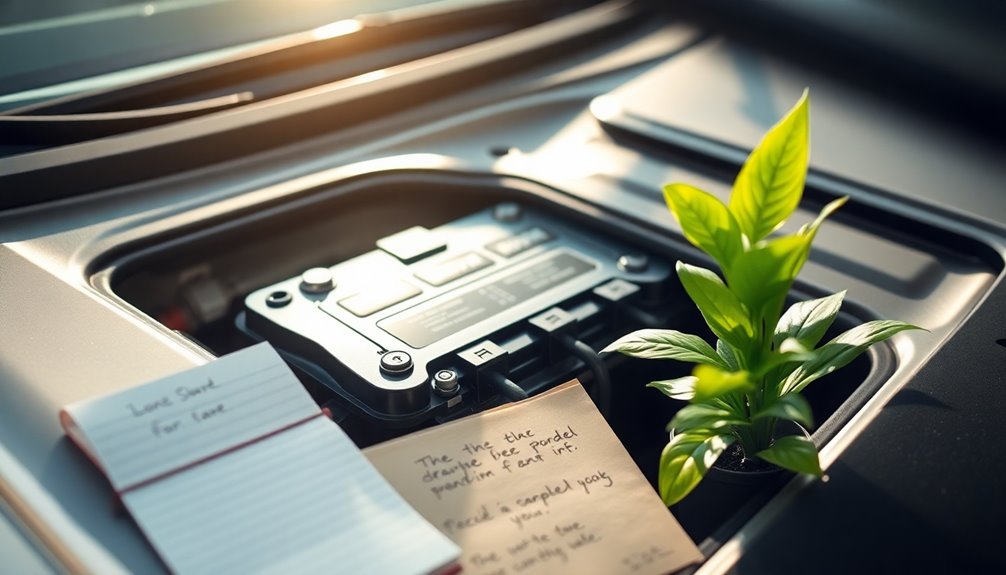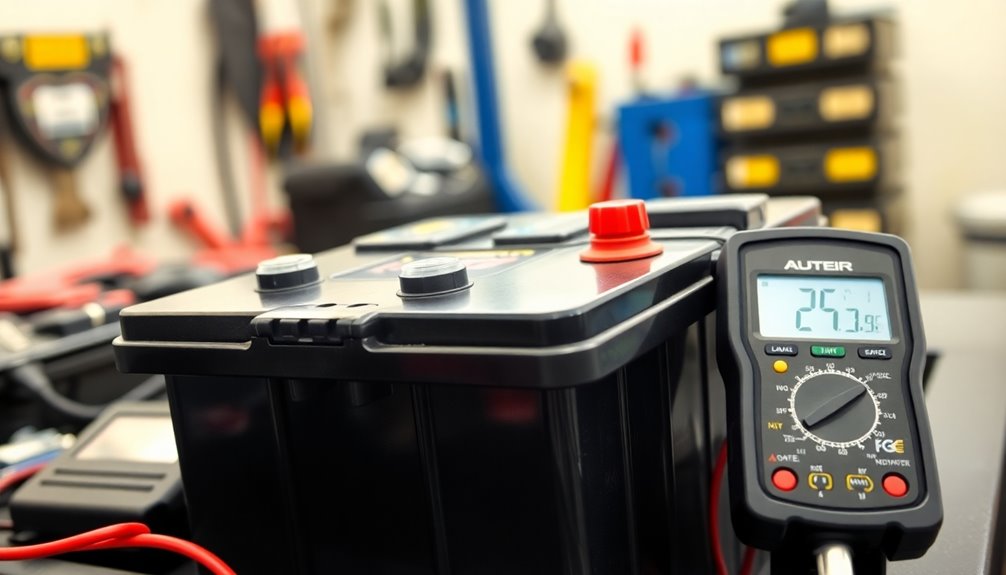Car batteries usually last between 3 to 5 years, but you can extend their lifespan with a few simple tips. Regularly check voltage levels, aiming for 12.4 to 12.7 volts when the engine's off. Clean any corrosion from terminals and secure the battery properly. Try to avoid extreme temperatures by parking in shaded areas or garages. Additionally, limit short trips to guarantee full charging cycles. By following these practices, you can help maintain your battery's health and performance. There's even more valuable information on how to keep your car battery in top shape just ahead!
Key Takeaways
- Car batteries typically last between 3 to 5 years, depending on usage and maintenance practices.
- Regularly monitor voltage levels, ideally between 12.4 and 12.7 volts when the engine is off.
- Protect batteries from extreme temperatures by parking in shaded or garage areas to prevent degradation.
- Limit short trips to ensure the battery undergoes complete charging cycles for optimal longevity.
- Clean terminals to prevent corrosion and use a battery maintainer for vehicles not regularly in use.
Car Battery Functionality
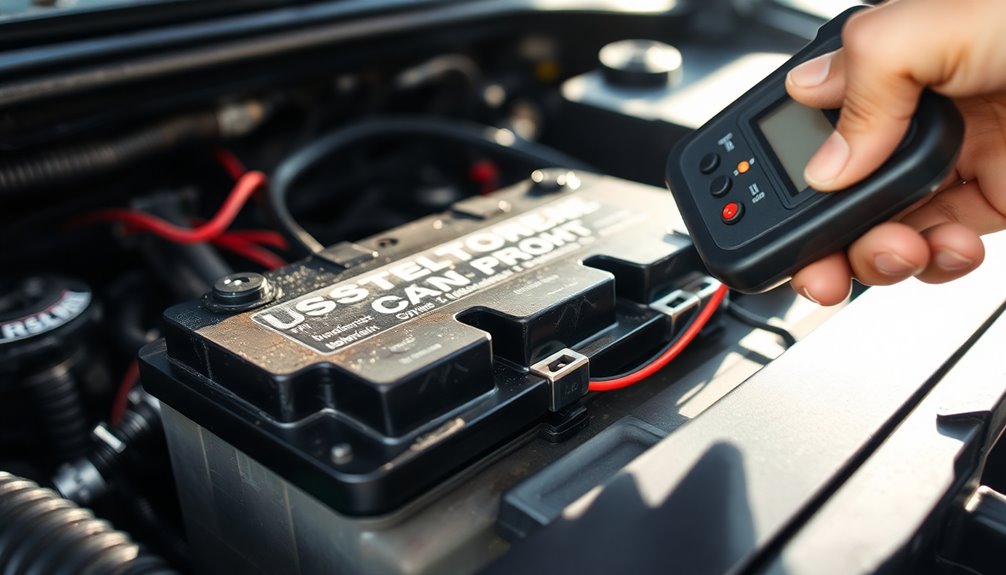
When you start your car, the battery plays an essential role in powering the vehicle's electrical systems through a chemical reaction between sulfuric acid and lead plates. This process generates the electrical energy necessary for everything from ignition to lights.
To guarantee your car battery functions at its best, regular monitoring is key. Check voltage levels and look for signs of corrosion to maintain battery health. Proper maintenance can greatly extend the life of your battery.
Avoid extreme temperatures and keep charging levels in check to prevent premature failure. Understanding how your battery operates will help you troubleshoot issues early, assuring reliable performance and maximizing your car battery life.
With care, you can enjoy a dependable driving experience for years to come.
Average Lifespan of Car Batteries
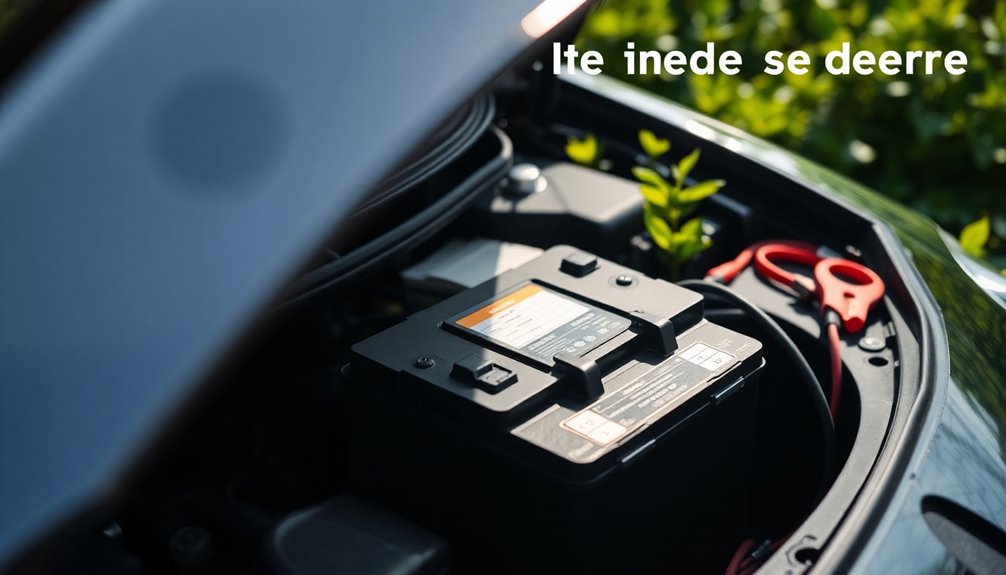
Understanding how your car battery functions leads to important insights about its lifespan. The average battery lifespan is typically between 3 to 5 years, but this can vary based on usage and maintenance.
High temperatures can evaporate fluids and accelerate wear, while extreme cold can hinder performance. Your driving habits also play a significant role; frequent short trips may prevent your battery from fully recharging, leading to a shorter lifespan.
To extend battery life, regular maintenance is key. Cleaning terminals and ensuring secure connections can enhance functionality, regardless of climate.
Common Reasons for Battery Failure
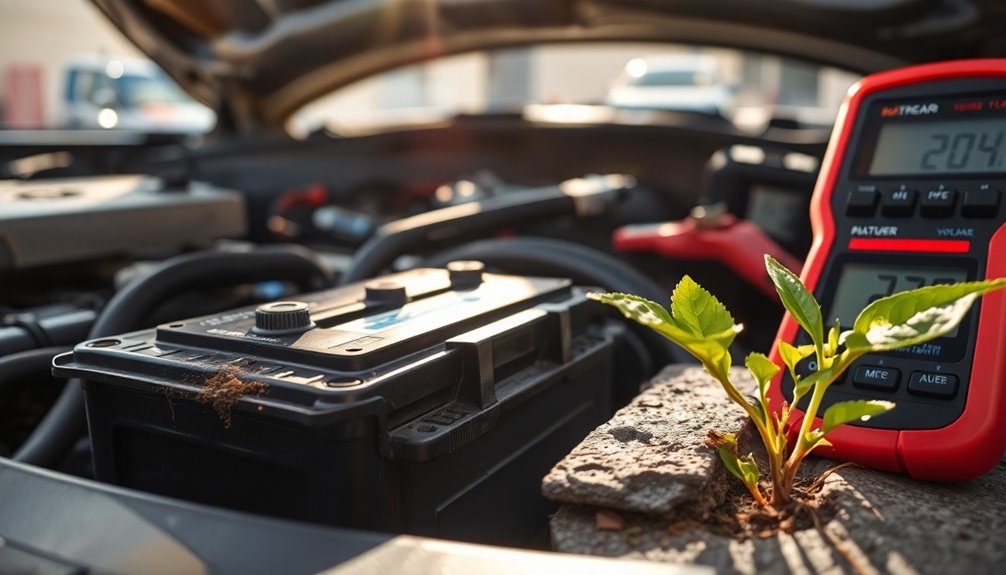
When it comes to car battery failure, a few common culprits often come into play.
Extreme temperatures can wreak havoc on your battery's performance, while power drain from lights or electronics can leave you stranded.
Plus, corrosion at the terminals can disrupt charging and lead to even bigger issues.
Extreme Temperature Effects
Extreme temperatures play an essential role in battery performance, as they can lead to significant issues that affect your vehicle's reliability.
In cold weather, your battery's ability to deliver power diminishes, causing slower cranking and potential starting failures, especially below 32°F (0°C).
On the flip side, high heat can accelerate corrosion and fluid evaporation, shortening the lifespan of your battery by up to 50% compared to those in moderate conditions.
To maintain battery health, consider parking in shaded areas or garages during hot weather.
Regularly monitoring your battery's condition during extreme temperatures is vital, as environmental factors can lead to unexpected battery drain and failure.
Taking these steps can help you avoid inconvenient breakdowns.
Power Drain Issues
Battery health isn't just affected by temperature; everyday habits and hidden issues can also lead to unexpected power drains.
Here are some common culprits:
- Leaving lights on when parked
- Poorly installed electronics like stereos or alarms
- Extended periods of parking without driving
- Age of the battery affecting performance
These power drain issues can greatly impact your battery lifespan.
For instance, even small lights can deplete your battery over time. Additionally, if your battery terminals are corroded or loose, they can hinder charging efficiency.
Regular vehicle use is essential to keep your battery charged, especially if it's older than three to five years. Being aware of these factors can help you avoid premature battery failure.
Corrosion and Connections
Corrosion and poor connections can spell trouble for your car's battery, often leading to unexpected failures. Corrosion, visible as blue-green fuzz on terminals, can block charging and disrupt connections. Loose or damaged connections hinder power transfer, causing performance issues.
| Issue | Solution |
|---|---|
| Corrosion | Clean terminals with a baking soda solution. |
| Loose Connections | Regularly inspect and tighten clamps. |
| Maintenance | Schedule routine checks to prevent buildup. |
Tips to Extend Battery Life

To extend your car battery's life, make sure you regularly test its condition and performance.
Keeping the terminals clean can prevent corrosion that hampers function.
Also, monitor your driving habits; longer trips allow the battery to recharge fully and stay healthy.
Regular Battery Testing
Regular testing of your car battery every six months can greatly enhance its lifespan and reliability. By regularly testing your battery, you can identify potential issues before they become serious problems.
Here are some tips to keep in mind:
- Use a battery tester to check voltage levels; ideal readings are between 12.4 and 12.7 volts when the engine's off.
- Perform a load test to simulate the battery's performance under stress.
- Take advantage of free battery testing services offered at many auto parts stores.
- Keep a record of your test results to track performance over time.
- Additionally, maintaining a clean environment around your battery can prevent high dust or humidity that may affect its performance.
These practices not only help extend lifespan but also guarantee your vehicle starts reliably when you need it most.
Clean Terminals Often
While you mightn't think about it often, keeping your car battery terminals clean is essential for ensuring peak performance.
Regularly cleaning your terminals with a baking soda and water solution effectively removes grime and corrosion, maintaining optimal electrical connections and preventing power loss. Aim to inspect your battery terminals at least once a month; catching corrosion early allows for timely maintenance before it affects battery performance.
After cleaning, apply a thin layer of petroleum jelly to your clean terminals to create a protective barrier against future corrosion. This simple step not only enhances battery longevity but also reduces the risk of unexpected breakdowns due to poor connections.
Make terminal maintenance a priority for a reliable vehicle.
Monitor Driving Habits
Keeping your battery terminals clean is just one part of maintaining your car battery's health. To truly extend your car's battery life, you need to monitor its condition and adjust your driving habits.
Here are some tips to reflect on:
- Aim for longer drives to fully recharge your battery.
- Turn off all lights and electronic devices before exiting.
- Reduce idling time and limit electrical system use.
- Use quality battery chargers when the car's not in regular use.
Being mindful of these habits can greatly enhance your battery's longevity.
Additionally, reflect on the weather; parking in shaded areas can help minimize heat exposure, further protecting your battery.
Maintenance Practices for Longevity
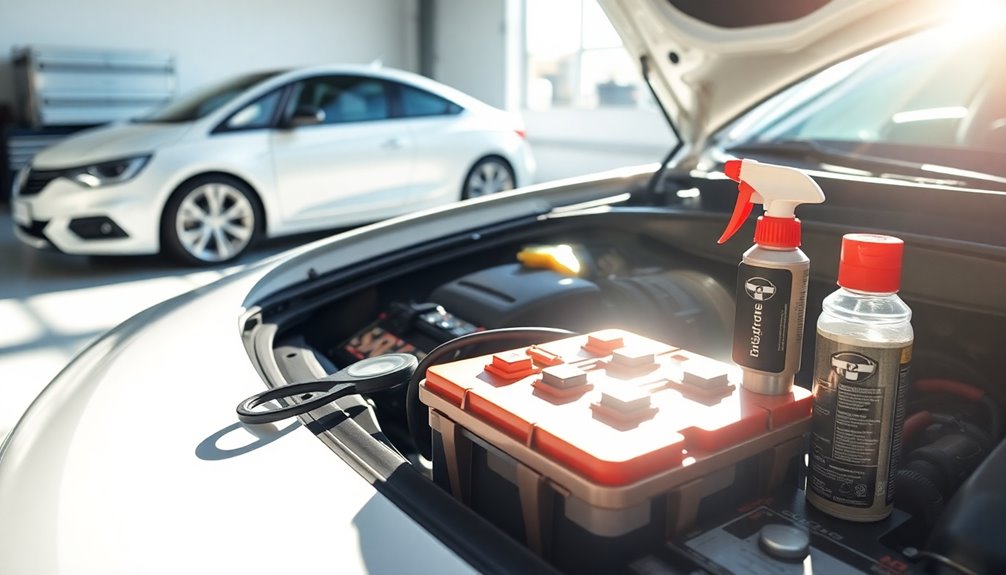
To guarantee your car battery lasts as long as possible, it's essential to implement some key maintenance practices.
Start by regularly cleaning battery terminals with a baking soda and water solution to prevent corrosion that can hinder charging.
Make sure your battery's securely fastened in place; this minimizes internal damage caused by vibrations, extending its lifespan.
It's also wise to test the battery condition at least twice a year to monitor voltage levels and identify when replacement is needed.
Before you exit the vehicle, turn off all electronic devices and lights to avoid unnecessary battery drain.
Finally, consider using a battery maintainer during long periods of inactivity to keep charge levels stable and prolong your battery life. Additionally, staying informed about AI technology integration can help you make better decisions for your vehicle's electrical systems.
Environmental Impact on Battery Health

Environmental factors play an essential role in your car battery's health and longevity.
Extreme temperatures, humidity, and exposure to corrosive elements can greatly impact your battery's lifespan.
Here are some key considerations:
- High heat can evaporate fluids, accelerating degradation.
- Cold weather slows chemical reactions, reducing performance.
- Parking in shade or garages helps prevent overheating.
- Regular monitoring and maintenance counteract negative effects.
Frequently Asked Questions
How Can I Extend My Car Battery Life?
To extend your car battery life, regularly test its condition with a battery tester to catch issues early.
Limit short trips, as longer drives recharge the battery effectively.
Keep terminals clean to prevent corrosion, and guarantee the battery's securely fastened to avoid damage from vibrations.
If you're not using your vehicle often, consider a battery maintainer to keep charge levels stable.
These simple steps can greatly enhance your battery's longevity.
Is a 7 Year Old Car Battery Still Good?
A 7-year-old car battery likely isn't reliable anymore.
As batteries age, their performance declines, which can lead to issues like slow engine cranking or dim headlights.
If you've got a battery that old, it's wise to reflect on replacing it soon.
Regular voltage checks can help, too; if it's below 12.4 volts, it's time to contemplate a new one.
Don't wait for an unexpected breakdown—stay proactive!
Is It Bad if a Car Battery Tips Over?
If your car battery takes a tumble, it's not just a minor misstep; it can lead to a messy situation.
The electrolyte might spill, causing corrosion and disrupting electrical connections. You're risking reduced performance and a shorter lifespan due to potential internal damage.
To keep everything running smoothly, make sure your battery's securely fastened. If it tips over, inspect it right away for any signs of damage or leakage.
What Shortens the Lifespan of a Car Battery?
Several factors can shorten your car battery's lifespan.
Extreme temperatures, both hot and cold, can wreak havoc on its performance.
Frequent short trips prevent your battery from fully recharging, while corrosion on terminals or loose connections can diminish its efficiency.
Additionally, leaving electronics on or having hidden power drains can quickly deplete your battery when the engine's off.
Regular maintenance and awareness of these issues will help prolong its life.
Conclusion
In the journey of your car, the battery is like the heart, pumping energy to keep everything alive. By nurturing it with proper care and awareness, you can guarantee it beats longer and stronger. Embrace the tips shared, and you'll not only extend its lifespan but also enjoy smoother rides. After all, a well-maintained battery is the silent companion that fuels your adventures, ready to power you through every twist and turn on the road ahead.

